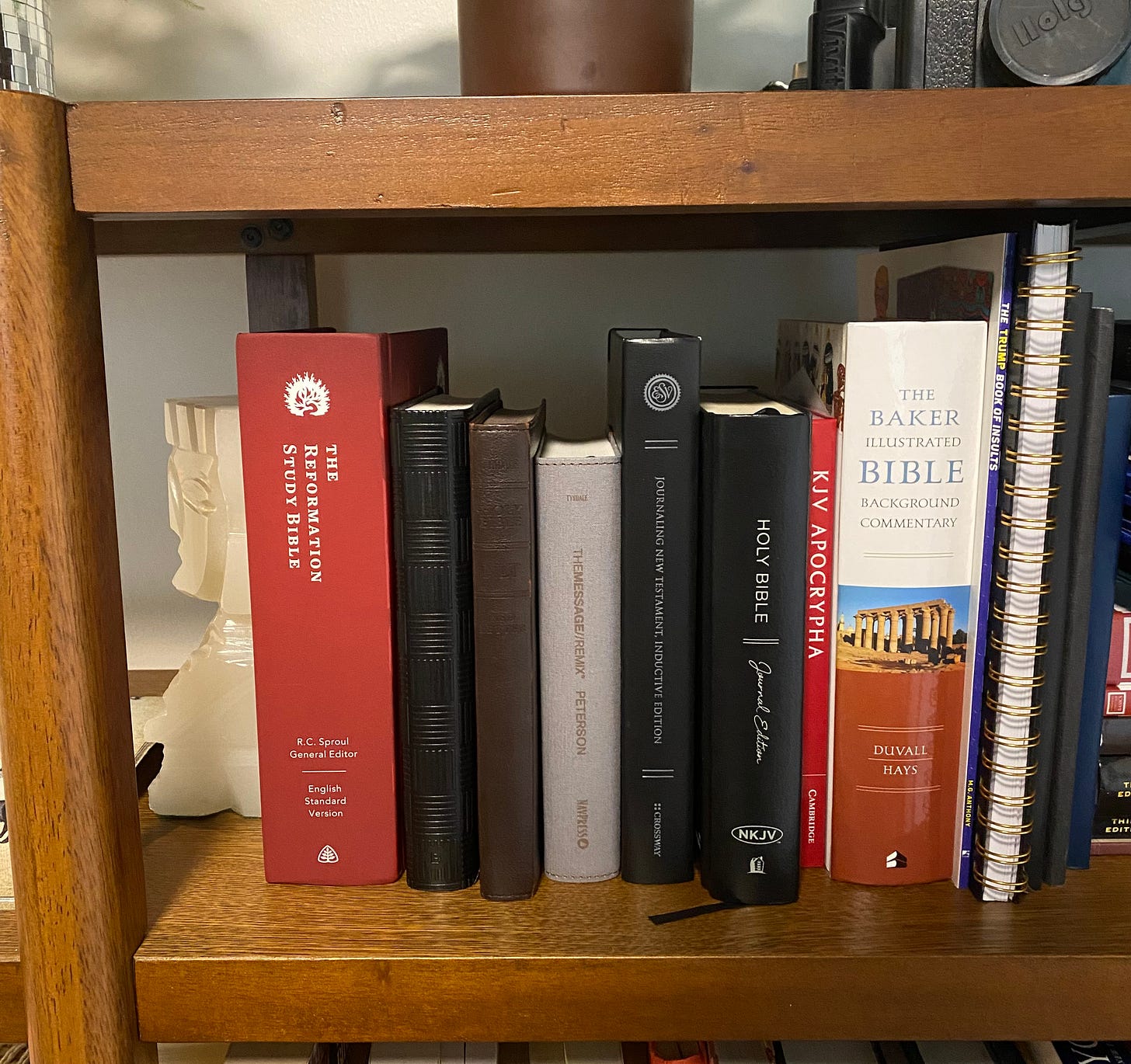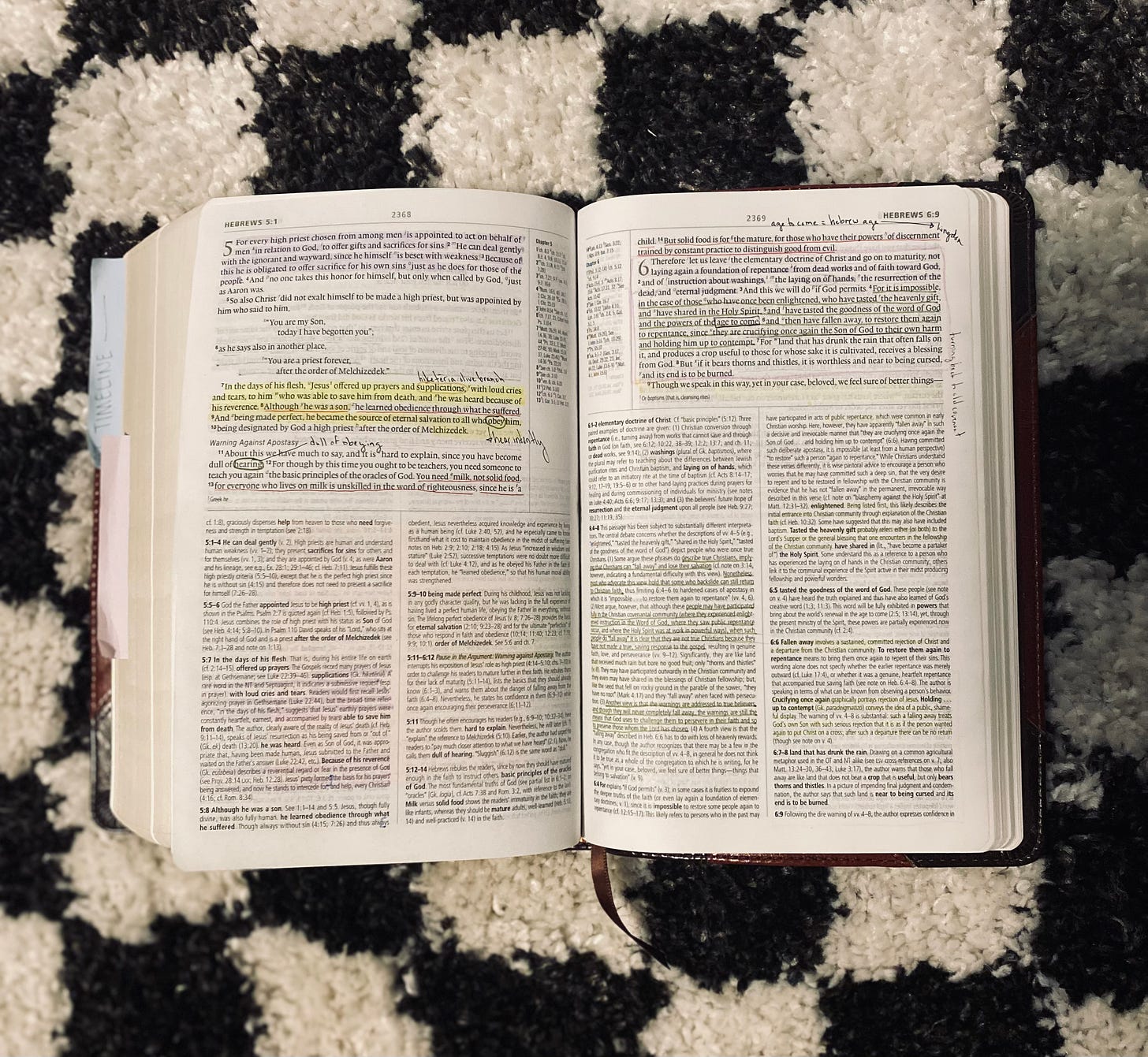Bible 101: Finding the Right One
4 tips on how to get started when you honest to God don't know where to start
Whether you have been reading the Bible since you were 5 or just started yesterday, everyone struggles with the first step in their “biblical” journey: picking out which Bible to read (because there are thousands of options, and we live in a society that love options, hence white woman influencers having a constant and steady love affair with Amazon).
“What Bible translation do I get? King James Version is the WORST. It’s like I’m reading Shakespeare.” (Hint: if you’ve tried to start with King James and can’t commit, King James is your problem. Dump him like your ex.)
“Do I get a study Bible? They’re waaaaaaay too large.” (Similar to pants, they make small ones and big ones. You don’t need a Catholic Family Bible - this is a joke, because if you have ever seen them, they happen to be the size of a fossilized mature T-rex skull.)
“Should I get a journaling Bible so I can take notes?” (You’re getting ahead of yourself. Focus on reading first.)
“Where do I even buy one?? Does Barnes and Noble have them?? Amazon?? THE GROCERY STORE??” (Lots of places. All of the places. The internet. Everywhere.)
1. Picking the right translation is crucial.
Let’s do a refresher course real quick. The Bible was not originally written in English.
*gasp*
If you didn’t know that, now you do. It is something that I will continue to write about fifty more times, maybe more, because if you don’t understand that rather large fact, you’re doomed.
The Old Testament was initially written in Ancient Hebrew (with some portions in Ancient Aramaic), while the entire New Testament was written in Ancient Greek. I use the term “ancient” because modern Hebrew and Greek are a smidge different. Obviously, we know that language changes over time, and this is no exception.
Quick history lesson from the Rev. Dr.: the Bible is made up of 66 different books written over a long period of time and in those original languages mentioned above. The 66 books were chosen and organized by councils of rabbis and church leaders. The printing press was OBVIOUSLY not around back in AD 100, so the Bible had to be copied by hand by scribes who were incredibly meticulous. After a while, the Gutenberg was invented, and the Bible was printed for the first time in Latin.
With that being said, there are hundreds of different translations today that you can choose from. All of them have done the hard work and differ slightly by their translations. The message is the same, but the words are a little different.
How could this be? Well, for every English word we have, the ancient Hebrew language had 15, AND each Hebrew word has 15 more definitions. For example: our word “good” is the Hebrew word “tob”, which means good…..but also means pleasant, favorable, agreeable, excellent, rich, kind, etc.
“So, Rev. Dr. Nikki, let’s cut the crap. Which translation should I buy?”
Great question. This is not a one size fits all situation, my friend. There are translations I love, and then there are translations that I harbor SO much disdain for that I would rather be thrown out of a moving vehicle than recommend them. However, this is an unbiased Substack, so I will hide my feelings.
My first recommendation is to visit blueletterbible.org, type in Psalm 23, and go through their translations listed to find the one that makes the most sense to you.
The translation needs to a) be clear and concise to you and b) still sound a little like music. The beautiful thing about Scripture is that it is God-breathed. Was it written by man? Yes. BUT, it was inspired by God and God had authority over what was written. If something is written by God, it isn’t going to be boring. He is the least boring person I know. Boring people don’t write boring stories.
My second recommendation is to listen to my opinion and then test it out. Below I have listed the most popular translations with my summary and rating of them.
King James Version (KJV): old, Shakespearean and confusing in every possible way. Great for the Psalms. Awful for the rest of the Old Testament. Perfect if you desire a little tradition in your life or enjoy using ye olde English dictionary. Absolutely awful if you don’t qualify yourself as an excellent English speaker. It’s the angry grandpa at Thanksgiving who hates everything and wants you to know, but still slips you a $20 after dessert. 5/10.
New King James Version (NKJV): not as old, but still old. Less Shakespearean and more poetic. A little more straight forward. Relatively good for the entire Bible. You will still need a dictionary at times, but not as frequently. Perfect if you want the tradition of KJV without the drama. It’s the sweet great-aunt at Thanksgiving who stays quiet while a political fight breaks out and winks at you every time someone references Twitter. 8/10.
New Living Translation (NLT): not old at all. If a translation could be defined as young, this would be it. Easy to understand. Would easily use acronyms and “hip” terms if the publisher deemed it appropriate. Not poetic at all. It’s the 15 year old cousin at Thanksgiving who won’t get off her phone, but listens to 90’s hip hop and Alicia Keys exclusively. 6/10.
New International Version (NIV): not as young as NLT, but still young. Can be poetic when it wants to be, but pretty standard. It’s a straight lane compared to others. You know what to expect. It’s your dad at Thanksgiving, waiting for everyone to leave so he can turn on reruns of Jay Leno before bed. 7/10.
English Standard Version (ESV): the Cinderella if NLT and NIV were the ugly stepsisters. Perfect if you are wanting one that has the best translation for all ancient words. Poetic. Easy to read. Great for anyone. Lacks big words, for good reason. It’s your best friend’s fun mom at Thanksgiving, who insists on adding more marshmallows to every sweet potato dish because “we could all use more joy these days.” 9/10.
Christian Standard Bible (CSB): it is exactly what it is called. It’s standard. Not poetic, but not *not* poetic. Some big words. Some confusion, but easy to understand. It may or may not be your almost-drunk uncle at Thanksgiving who secretly keeps pouring bourbon in the communal egg nog jug. 5/10.
New English Translation (NET): I won't lie to you, it’s basically the same as CSB, but with a fancier name and a better synonym generator. Sometimes people won’t buy something unless the title is more fun. This is a perfect example of this. It is the almost-drunk young cousin at Thanksgiving who doesn’t know his dad keeps pouring bourbon in the communal egg nog jug. 6/10.
Notable mentions:
Amplified Bible (AMP) for anyone who ever wanted to add a subwoofer in their car. If I could summarize in a sentence, it would be Jim Carrey saying “alrighty then.”
New American Standard Bible (NASB) for anyone who doesn’t judge books by the cover. If I could summarize in a sentence, it would also be Jim Carrey saying “alrighty then.”
The Message (MSG) for people who need a LOT of pizazz in their life. I don’t recommend using this as your sole bible, but great for a supplement. If I could summarize with a song, it would be Will Ferrell singing anything, but specifically singing the song from Step Brothers.
The Passion Translation (TPT) for people who need pizazz, but less pizazz. Same idea with this one: use only as a supplement and not as your only Bible. If I could summarize with a song, it would be Whitney Houston’s “Greatest Love of All.”
2. Understand your needs and evaluate if you want a Study Bible or a standard Bible.
The answer to this question is simpler than you may think.
Either you want to read the Bible as is or you want to dig a little deeper. This is not a trick question.
Let’s break this down. You are one of two people:
“I just want to read the Bible. I don’t want to worry about little blurbs. I just want to read. If I wanted more information, I would buy a book about the specific topic I want to know about.”
“I want to know a little more. The Bible is confusing to me, so having a little extra information would be really helpful.”
If you are #1, buy a standard Bible. You are lucky in this respect because they are a little cheaper. Don’t get a hardcover. Get a nice leather bound one. Find the translation you like and get one that feels soft when you hold it. You are more likely to read it if you think it looks and feels nice.
If you are #2, buy a Study Bible. They are a little bulkier and more expensive, but you are paying for supplemental information. Start off slow and get whatever translation you like and the most basic Study Bible that is offered. (i.e. I enjoy the personal size ESV Study Bible.)
3. But what about journaling Bibles??
Listen, if you REALLY want one, go for it.
HOWEVER, a journaling Bible isn’t going to make you read it anymore than the other options. I recommend getting a study or standard and once you feel like you are in the groove of reading, you can consider buying a journaling Bible.
A nice taste-test for you, if you want one THAT BAD, use a notebook for a few chapters. If you use the notebook that much, go for it. If you don’t, just wait.
Journaling Bibles aren’t going anywhere. They are here for the long run. Take your time.
Quick FAQ with the Rev. Dr. : It is not a sin to write in your Bible. It is not a sin to highlight in your Bible. God has given us the ability to buy as many Bibles as we want. We have complete access. If you feel that marking it up is causing you some stress, just buy a notebook. God wants us to study His word. If we don’t study His word, we miss out on a lot of His character that we wouldn’t otherwise know. The Bible is holy, and so is our act of studying it.
4. Wow! You are a great salesman! Where do I buy a Bible?
Everywhere. Amazon. Barnes and Noble.
I recommend buying local, or directly through the publisher (Crossway, Tyndale, Zondervan, etc.)
Any other questions?
Next up, we will be discussing where to start reading and some study tips on how to get the most out of what you’re reading. If you need help finding a new Bible, reach out to me. I am a pro at this point, especially considering how many I own. I’d be lying if I said I didn’t have two or three more in my online shopping cart right now (I’d say sorry to my husband, but he knew what he was in for when he married me).






I have so many Bibles, it’s not even funny! And I still don’t know which translation I like the best haha